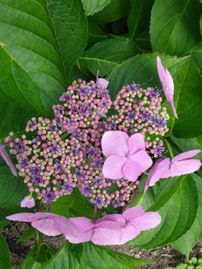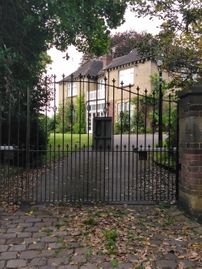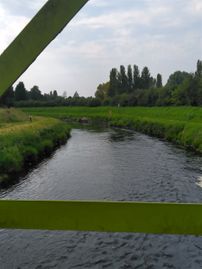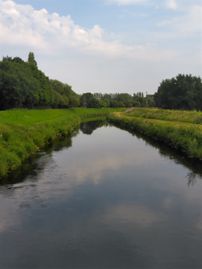'House and Garden'
Hydrangeas were making a come back, their vast blooms, for a time as grannified as the aspidistra, being once more appreciated for their vigorous generosity and variety. It made you reconsider the daring risks taken by early plant hunters to acquire these once exotic and now everyday park and garden shrubs. They came to European eyes first during Japan’s two hundred years of isolation after 1639, when it was sequestered under shogun rule. Suspicious, feudal and riven by war lords, it was closed to foreigners except for the island of Dejima in Nagasaki Bay, where a visitor was given some specimens; ‘gifted’ as they would say nowadays, Marion, browsing the net for information, thought to herself.
Marion was planning to buy some hydrangeas from the garden centre after she and Nick had been for a soothing walk by the canal-like banks of the river. Once more, overnight, her tenderly propagated annuals had been devoured by slugs the size of walruses and snails freeclimbing up to her wall hung planters. Her evening ritual of creating magic circles with natural ingredients (salt, coffee grounds, smashed up eggshells) to put them off, had, equally as usual, been rendered useless by overnight torrents. If Marion felt as frustrated as this herself, how must doctor and botanist Philipp Franz von Siebold have felt, when he was expelled from Japan in 1829 accused of spying for the Russians, and then, partly due to an independence war between Belgium and the Netherlands, had to abandon his lovingly acquired hydrangea plants, tubers and bulbs in the botanical gardens of Ghent in 1830? Still, the hydrangeas had got back to Europe where, judging by their long life in suburban flowerbeds, they eventually did well. Yes, it was time for a hardier option and hydrangeas it would be.
It was also time to distract her husband, Nick, from the bizarre looking extension their neighbours were creating on their house. It had, at present, a barrack-like appearance with shingled cladding and the whole thing offended him deeply. He had lost his objection to the planning permission being given and, disregarding relations with these relatively recent neighbours, would shout things over the fence at them whenever they and builders were about such as,
“Have you got a licence to crenellate?” or less jovially,
“Are you starting a sect? Looks like Waco over there!”
Today, irritated beyond endurance by Sunday morning masonry drilling, he had bellowed,
“You do know fracking’s illegal here, don’t you?” which made Marion finally decide that it was high time they went out.
Design was on Nick’s mind and they stopped outside the gates of a fine looking house near the park, distinguished and exclusive in its large and private place.
“Now, that’s what a house should look like!” he admired. “Look at the proportions of that!”
“Yes, but for most of us it’s a house you could only look at, not aspire to live in,” said Marion, who knew, of course, where he was coming from with this.
“If they can afford to build that heap, they can afford to go somewhere bigger in the first place!” declared Nick. “Ruining a perfectly decent family house for that!”
“Seems to be all the rage round our way, doesn’t it? Very strange. I do agree that it spoils the original structure” commented Marion, as they moved along.
“Mind you,” Nick contradicted himself. “People with money have always bolted on, haven’t they? Regency on to Tudor manor hall, Victorian added on top of that. What would Prince Charles call that extension next door to us, one of his monstrous carbuncles?”
“Not like you to be quoting the Royals.”
“No. Well. If the cap fits,” said Nick irrelevantly.
“I never thought we’d turn into Nimbies,” said Marion, as they paused on the river bridge to take in the peaceful view. “What’s happened to our old campaigning spirit?”
“Overtaken by events,” said Nick. “I mean, who’s rocking against racism now?”
“Perhaps they should be,” suggested Marion, “instead of whitewashing history by knocking statues down.”
“You can’t say whitewash! Probably on the proscribed list,” said Nick in mock outrage.
“No, I probably can say that. Come on,” Marion urged, “we’d better get to the garden shop, they close early on Sundays.”
“Well, don’t be ages. I feel like I’m in a day centre when I’m waiting for you in the snack bar there,” grumbled Nick. “Talk about the halt and the lame...”
“Now that is a hate crime,” pointed out Marion.
“Is it? Oh, I suppose it is. Better watch my smoke, then,” said Nick.
In the garden centre, Marion made her careful selection of hydrangeas, including a climbing vine variety suitable for a north facing wall, as advised by ‘Gardeners’ World’ (a programme which Nick couldn’t abide so she was left to absorb it without acerbic asides). When she appeared with her trolley, fronted by large, pinky purple flowerheads, Nick said scathingly,
“Blimey, it’s me Auntie Florrie! You’ll be turning out in a wrapover pinny next.”
Back home, Marion planted up her new collection and spent some time placing the climbing vine, envisaging a cottage garden-like glory of nodding white heads when it reached maturity. Inside again, she read over the qualities of each particular type she had bought on the computer.
“Oh, no!” she cried. “The climbing hydrangea gets eaten by slugs and snails as well!”
She felt her coming disappointment keenly.
“That’s life, kid” said Nick, who was back at his watching post as the extension progressed next door.
Thankfully, due to the Covid-19 restrictions presently in place, he couldn’t go further towards it than the garden. Marion considered it might be politic, when the embargoes were lifted, to pretend otherwise, so that like Japan when foreign visitors were embargoed from travelling there, she could keep him in strict isolation from any further direct confrontation over it. If the hydrangeas bloomed in the hoped for profusion, he could peer out of them, Japanese soldier style, hiding out years after the war against infection had ended, deludedly contained from battle in their jungle fastness. She rather liked that idea, she thought, going to dig out this morning’s eggshells from the recycling bag, so that she could bash them up, however futile the effort, to spread protectively around the newly planted pot of Hydrangea Petiolaris.
Share this page



